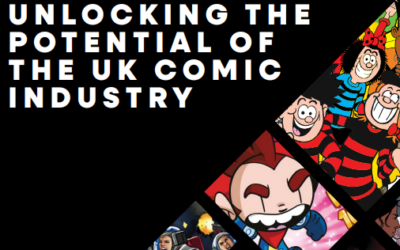The UK Government published a 10 year plan to support and facilitate growth in the UK’s creative industries on Monday 23 June 2025. The plan sits as part of the Government’s full industrial strategy, with creative industries recognised as one of eight sectors with high-growth potential.
The UK comics industry is a foundational part of the creative sector, creating content, generating IP and nurturing the talent that much of the wider creative industries relies on. As such, the plan is a key point of reference for Comic Book UK’s mission to make the UK the best place in the world to create, publish and sell comics and graphic novels. It presents a wide range of initiatives and opportunities for the comics industry to work with – not least in potential routes to finance and talent development programmes. There are also some notable gaps and uncertainties to contend with – particularly the ongoing ambiguity about how rights holders and creative professionals will be supported in an age of generative AI. Over the coming months Comic Book UK will work with members, partners in the wider creative industries and figures across Government to ensure that the plan’s potential to support growth in UK comics is maximised.
In the meantime, the following are 5 immediate observations on what the sector plan means for the comics industry.
- It is good news that the creative industries are recognised as a national strength with high growth potential.
As Secretary of State Lisa Nandy rightly states in her forward to the plan:
“The UK’s creative output, our creative history and our future creative are unmatched. The sector already acts as a dynamic growth engine for our economy across the UK’s nations and regions, contributing 2.4 million jobs and £124 billion GVA to the economy, generating knowledge spillovers that drive innovation and activity across the economy.”
This level of recognition, both of the immediate economic value of the creative sector as well as the purpose it serves as an engine of national soft power and national identity is very welcome. Even more welcome is the fact that this recognition has been translated into such a detailed plan – and accompanying investment commitments.
The UK comics industry sits proudly as part of the wider creative industries, creating content, generating IP and nurturing talent that others rely on as well as being valuable in its own right. Being part of a sector that the Government has shown a clear commitment to will be an advantage as the industry looks to grow over the coming years.
- It is disappointing that publishing is not among priority subsectors identified in the plan but there is an opportunity for comics to play an ever-more vital part of those that are.
In keeping with the structure of the overall Industrial Strategy, the Creative Industries Sector Plan identifies four subsectors to prioritise for growth-boosting support: Film and TV; Music, Performing Arts and Visual Arts; Video Games; and, Advertising and Marketing. Publishing is notably absent from this list. This is disappointing and a little surprising. As Creative Industries Minister Chris Bryant said at Comic Book UK’s recent Parliamentary reception, Britain exports more books than any other country in the world. By any stretch of the imagination, Britain’s publishing industry is a real national strength. UK comics have a foot in both book and periodical publishing through graphic novels and comic magazines. Publishing’s absence from the subsectors prioritised in the plan must not mean that the comics industry is ignored for targeted support measures – including tax credits and reliefs.
Encouragingly, the sector plan emphasises that creative industries are an interconnected ecosystem, with subsectors overlapping with one another. This is particularly true for the comics industry. For example, Comic Book UK’s membership includes imprints generating and servicing IP for parent video game and film production companies. Many of the creators that produce content for comic companies also work in TV and film storyboarding, or video game character design. Comic writing often sits beside screenwriting in career portfolios, and the stories and characters that originate in comics are much sought after for translation into other media. Building greater recognition of comics as part of subsectors that have been prioritised in the sector plan will be just as important as ensuring that publishing is not deprioritised.
- It is very welcome that the plan puts a strong emphasis on developing the creative workforce and promises support for freelancers.
Access to new generations of talent is key to growth in UK comics. Growth relies on UK creatives with the talent, professional attributes and commercial nous needed to build rewarding careers, as well as people with management, marketing, innovation and other business skills needed to drive the industry forward. It is therefore good news that the sector plan puts a strong emphasis on the creative workforce and freelancer economy.
Education is a big part of this and it is encouraging to see that the Curriculum and Assessment Review, expected to be published in the Autumn, will seek to “ready people for life and work, including in creative subjects and skills.” It is also good news that the plan commits the Government to measures that support access to high quality creative education and training opportunities, as well as a national creative careers service, through collaboration with industry.
Comics offer a relatively low-barrier point of entry to careers in the creative industry to people of all social backgrounds. We will explore opportunities to play a part in the various skills-development and career-guidance initiatives.
Perhaps most immediately important for comics, the sector plan outlines a commitment to establish a ‘creative freelance champion’ to advocate within Government and sit on the Creative Industries Council. Creative freelancers are the backbone of the UK comics industry but can face challenges of irregular income, lack of professional development opportunities and other disadvantages of working outside of an institutional infrastructure. The sector plan’s commitment to a dedicated advocate to drive greater support for freelance creatives could empower them to make an ever-greater contribution to the growth of the UK comic industry. We will consult with Comic Book UK members’ freelancer communities to inform our approach to advising the Government on the scope and remit of the Freelance Champion.
- Improved access to finance could drive a rapid expansion of UK comics publishers and studios.
Access to early stage finance is a significant barrier to setting up and growing comics enterprises, holding comics back from making its fullest contribution to the UK economy. Investing in early stage publishers and creative studios offers returns through new titles finding worldwide audiences, creative studios providing services to a global market, and UK comics-originated IPs being developed as valuable assets.
It is therefore good news that the sector plan sets out measures that will better acknowledge the investment potential of IP-led content businesses and the intangible assets they create. Steps like increasing the British Business Bank’s financial capacity, funding specialist fund managers for the creative sector and the commitment to address barriers to lending to IP-rich SMEs will all help.
In addition, the mandate given to Creative UK (which Comic Book UK is a member of) to create a ‘single front door’ for creative firms to access information on how to unlock private investment stands to simplify the process for many that might otherwise face barriers.
The improved availability to debt and equity finance, and greater recognition of the upside and lower risk of investing in creative enterprises could help facilitate a rapid expansion in start-up and scale-up comics publishers and creative studios.
- A positive move towards licensing-by default but questions remain around copyright and artificial intelligence.
The prospect of allowing AI developers free-reign to scrape and utilise content and IP as training data has posed an existential risk to the UK’s comic industry. Comic Book UK took a firm stance in its response to the Government’s consultation on copyright and AI earlier this year: the content and IP owned by comic publishers and creators is a commercial asset that should not be available to AI developers without clear licensing arrangements in place. Building on the consultation response, Comic Book UK has been an active member of the Creative Rights in AI Coalition (CRAIC) – including being a signatory to Baroness Kidron’s letter to the Prime Minister urging better protections for rights holders through a transparency requirement amendment to the Data Use and Access Bill.
While the specific amendment was ultimately rejected by the Commons, the campaign did prompt the Government to commit to a full economic impact assessment of all of the options in the Government’s consultation.
It is good news that this commitment is reaffirmed in the sector plan, along with a pledge to establish a ‘Creative Content Exchange’ – a marketplace for selling, buying and licensing creative assets. This would pave the way for rights holders – including comic publishers and creators – being able to exert control over their content and IP, open up new revenue streams from their assets, and provide data-users with a route to high-quality content that does not involve scraping material they have no right to use.
However, it will be important for the model that is developed to address underlying licensing complexity and genuinely secure the confidence of comic publishers and creators, many of which operate as individual freelancers, micro-business and SMEs that may lack the legal, technical and financial capacity to participate fully in an IP marketplace without support.



